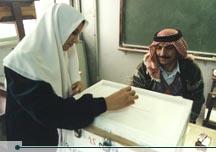 |
Keys
to the Kingdom National Anthem The Office History |
In April 1989, a caretaker government headed by Sharif (now His Highness Prince) Zeid bin Shaker was entrusted to supervise democratic elections for Jordan’s House of Deputies, thereby strengthening the process of political reform. Censorship was duly lifted and candidates for the lower house began to campaign independently, albeit under the banners of different ideological persuasions. Jordanians went to the polls on November 8, 1989, in the first general elections in twenty-two years. The fairness of the elections was acknowledged internationally and domestically by both winners and losers alike, and King Hussein was given credit for the measures he had taken to secure the return of democracy to Jordan. The electoral guidelines allowed all citizens over age nineteen the right to vote. Jordanian women were allowed to vote, having first gained the franchise in 1974, and were also entitled to seek office. Although the ban on political parties effected in 1957 remained on the books, candidates ranged ideologically from the extreme left to the extreme right. Most of these independent candidates formed loosely organized blocs according to political inclinations.
More than 640 candidates, including 12 women, competed for seats in the lower house, which was expanded from 60 to 80 members. The size of the appointed upper house, the House of Notables, was expanded to 40 members. For the first time in the country’s history, the entire spectrum of Jordanian society participated in the legislative branch of government. Since that time, Jordan has continued along the democratic path. Parliamentary elections were held in 1993 and 1997. Soon after the 1989 elections, King Hussein declared: “To continue Jordan’s liberalization process . . . and to reiterate our deep commitment to defending the human rights and dignity of our citizens . . . we decree that martial laws are cancelled.” Imposed as a result of the tense security situation resulting from the 1967 War and Jordan’s loss of the West Bank to Israel, martial law had preserved the status quo for more than twenty years. With the easing of tensions, the emergency regulations were frozen in 1989, and formally erased in April 1992. This new freedom opened the way for the legalization of political parties and the introduction of new press laws. On July 5, 1992, Parliament formally legalized political parties. |
 |
||
| Making it count
in the 1997 parliamentary elections. © Yousef Allan |
||